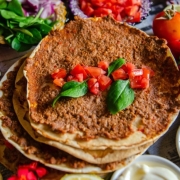A Contemporary Journey Through Culinary Flavors
A culinary adventure that takes us through the tantalizing world of Turkish cuisine. Bursting with flavors, rich in history, and influenced by a tapestry of cultures, Turkish cuisine is a true delight for the senses. In this blog post, we’ll explore the beauty and diversity of modern Turkish cuisine, highlighting its unique dishes, ingredients, and traditions that have captivated food enthusiasts worldwide.
Turkish cuisine is a testament to the country’s geographical and cultural diversity. As a bridge between Europe and Asia, Turkey has been a melting pot for countless civilizations, each leaving its mark on the culinary landscape. From the Ottoman Empire’s opulent palace dishes to the humble recipes found in Anatolian villages, the country’s culinary heritage is a treasure trove of flavors.
Modern Turkish cuisine embraces a harmonious blend of bold and delicate flavors. At the heart of many dishes lies the fragrant trio of spices: cumin, paprika, and sumac. Turkish chefs masterfully combine these spices with fresh herbs, garlic, and olive oil, creating dishes that dance on the palate with every bite.
No exploration of Turkish cuisine is complete without savoring the abundance of meze, small appetizer-like plates, often served as a prelude to a meal. These delightful offerings include classics like stuffed grape leaves (dolma), eggplant salad (patlıcan salatası), and savory pastries (börek). Meze is not just about the food but embodies the Turkish way of dining—sharing good food and great conversation with friends and family.
Turkish kebabs have earned international acclaim, and for a good reason. From succulent skewered meat (şiş kebab) to the famous doner kebab, prepared with layers of stacked meat, each dish is a testament to the Turkish mastery of grilling techniques. However, modern Turkish cuisine is not limited to kebabs. It offers an array of vegetarian dishes like imam bayıldı (stuffed eggplant) and mercimek çorbası (lentil soup), showcasing the variety and complexity of Turkish gastronomy.
Turkish cuisine has a sweet tooth, and the country boasts an array of delectable desserts that are truly irresistible. Baklava, with its layers of flaky pastry and honey-drenched nuts, is a world-famous treat that leaves taste buds enchanted. Other delights like künefe (cheese-filled pastry soaked in sweet syrup) and Turkish delight (lokum) come in a myriad of flavors and textures that are sure to please any sweet lover.
Turkish cuisine caters to all walks of life, offering a diverse range of culinary experiences. While street food vendors serve up mouthwatering gözleme (savory stuffed flatbreads) and simit (sesame-coated bread rings) to passersby, fine dining establishments present refined interpretations of traditional dishes with contemporary twists. Whatever your preference, Turkish cuisine has something special to offer.
The beauty of modern Turkish cuisine lies not only in its delicious flavors but also in its ability to tell a story through food. Each dish carries with it a piece of Turkey’s vibrant history and cultural heritage. From the rich tapestry of spices to the warmth of sharing a meal with loved ones, Turkish cuisine is a celebration of life, flavors, and the joy of gathering around a table. So, the next time you savor a Turkish delight or relish the flavors of a kebab, remember that you are experiencing the magic of a culinary tradition that has delighted generations and continues to captivate the world today.



